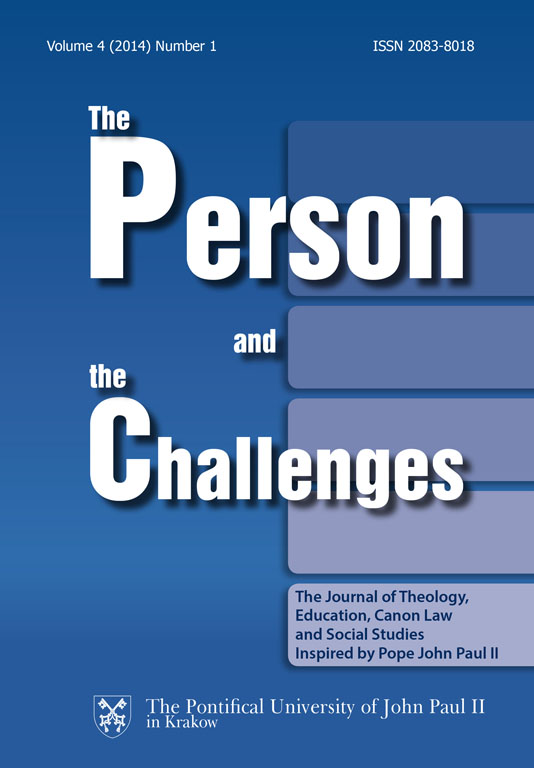Subjectivity in a therapeutic process as a predictor of psychotherapeutic success
DOI:
https://doi.org/10.15633/pch.52Słowa kluczowe:
Subjectivity, therapeutic process psychotherapy, internal motivationAbstrakt
Reflections on the uniquely human dimensions of behavior over the last few decades have become a meeting space connecting different sciences. The holistic health model emphasizes the subjectivity of man. Humans are open and active, and remain in relationships with others; they relate to the world they live in and seek meaning. Subjectivity in the psychological perspective can be described in three ways: subjectivity as identity, individuality, specific experience of self; subjectivity as the ability to initiate, regulate, direct, and realize goal-oriented and autonomous activity; subjectivity as the application of one’s own system of values. Subjectivity or causality (core features agency) expresses itself in the ability to make choices and planning, but also to directing actions and the realization of plans. The motivation to begin psychotherapy is influenced by numerous motives and conditions. Internal motivation is the main subjective resource in therapy. People internally motivated function better in better areas of life. They are characterized by greater involvement, activity, trust in their own abilities, persistence, creativity, a feeling of self-worth and general well-being. They experience engagement and immersion in the activities they undertake. The experience of causality – understood as the experience of being the author of events, the experience of having influence over events – is the fundamental cause without which the feeling of self-causality will not appear during development. As noted by R. White, it is a fundamental experience for good functioning and coping with the challenges of life, including illness.
Bibliografia
Aleksandrowicz J.W., Zaburzenia nerwicowe, Warszawa 1998, Wydawnictwo Lekarskie PZWL.
Bandura A., Self-Efficacy, New York 1997, Freeman.
Bugental J.F.T., W poszukiwaniu autentyczności, in: K. Jankowski (ed.), Przełom w psychologii, Warszawa 1978, Wydawnictwo Czytelnik, p. 325–340.
Cierpiałkowska L., Psychopatologia, Warszawa 2007, Wydawnictwo Scholar.
Dolińska-Zygmunt G., Teoretyczne podstawy refleksji o zdrowiu, in: G. Dolińska-Zygmunt (ed.), Podstawy psychologii zdrowia, Wrocław 2001, Wydawnictwo Uniwersytetu Wrocławskiego, p. 11–18.
Goldstein K., The Organism. A Holistic Approach to Biology Derived from Pathological Data in Man, New York 1939, American Book Publishing.
Grzesiuk L., Psychoterapia. Szkoły, zjawiska, techniki i specyficzne problemy, Warszawa 1998, Wydawnictwo PWN.
Kępiński A., Lęk, Kraków 2002, Wydawnictwo Literackie.
Kodeks Etyczno-Zawodowy Psychologa, Warszawa 1991, Polskie Towarzystwo Psychologiczne.
Kofta M., Orientacja podmiotowa: zarys modelu, in: A. Gurycka, M. Kofta (eds.), Podmiotowość w doświadczeniach wychowawczych dzieci i młodzieży. Cz. I: Wychowanek jako podmiot działań, Warszawa 1989, Wydawnictwo Uniwersytetu Warszawskiego, p. 35–46.
Lynch M.F., Theoretical contexts of trauma counseling, w: L.L. Levers (ed.), Trauma counseling: Theories and interventions, New York 2012, Springer, p. 47–58.
Mańka M., Polemiki wokół psychologii humanistycznej, “Przegląd Psychologiczny” 57 (1980) XXIII 3, p. 429–444.
Paszkiewicz E., Psychologia humanistyczna – między naturalizmem a antynaturalizmem, “Studia Filozoficzne” 5 (1978), p. 149–160.
Półtawski A., Filozofia Karola Wojtyły a fenomenologia, “Ethos” 19 (2006) nr 4 (76), p. 96–102.
Preston J., Zintegrowana terapia krótkoterminowa, Gdańsk 2005, GWP.
Rogers C., Uczyć się jak być wolnym, in: K. Jankowski (ed.), Przełom w psychologii, Warszawa 1978, p. 289–303.
Ryan R.M., Deci E.L., Intrinsic motivation and self-determination in human behavior, New York 1985, Plenum Press.
Ryan R.M., Deci E.L., A self-determination approach to psychotherapy: The motivational basis for effective change, “Canadian Psychology” 49 (2008), p. 186–193.
Smith L., Self-determination theory and potential applications to alcohol and drug abuse behaviors, “Journal of Alcohol and Drug Education” 55 (2011), p. 3–7.
Tokarz A., Problematyka podmiotu w wybranych koncepcjach motywacji, “Zeszyty Naukowe Uniwersytetu Jagiellońskiego – Prace Psychologiczne” 11 (1993), p. 19–29.
Uchnast Z., Metodologiczne problemy w psychologii humanistycznej, “Zeszyty Naukowe UJ. Prace psychologiczne” 9 (1993), p. 59–74.
White R., Motivation reconsidered: The concept of competence, “Psychological Review” 66 (1959), p. 297–233.
Wojtyła K., Osoba i czyn oraz inne studia antropologiczne, in: T. Styczeń, A. Szostek, W. Chudy (eds.), Człowiek i moralność, t. IV, Lublin 1994, TN KUL, p. 433–443.
Wojtyła K., Problem doświadczenia w etyce, “Roczniki filozoficzne” XVII (1969) 2, p. 5–24.
Pobrania
Opublikowane
Numer
Dział
Licencja
Prawa autorskie (c) 2014 Joanna Dzierżanowska-Peszko, Małgorzata Artymiak

Utwór dostępny jest na licencji Creative Commons Uznanie autorstwa 4.0 Międzynarodowe.
Autorzy publikujący w czasopiśmie udzielają jego wydawcy zgody o następującej treści:
- Autor zachowuje autorskie prawa majątkowe do utworu, a jednocześnie udziela wydawcy czasopisma zgody na jego pierwszą publikację w wersji drukowanej i wersji online na licencji Creative Commons Uznanie autorstwa 4.0 Międzynarodowe oraz zgody na wykonywanie opracowań, w tym przekładów.
- Autor ma możliwość udzielania zgody niewyłącznej na opublikowanie utworu w wersji, która ukazała się w czasopiśmie (np. zamieszczenia go w repozytorium instytucjonalnym lub opublikowania w książce), wraz z informacją o jego pierwszej publikacji w czasopiśmie.
- Autor może umieścić swój utwór online (np. w repozytorium instytucjonalnym lub na swojej stronie internetowej) jeszcze przed zgłoszeniem utworu do czasopisma.

